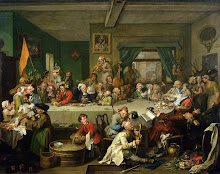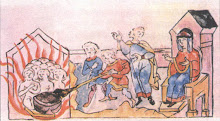On February 27, 1847, Fuller published this response to an unnamed "correspondent":
"'B' wishes to know why we do not publish the whole of the testimony in Poe's libel suit. We answer, because it involves a good deal of delicate matter, and introduces the names of several literary ladies, for whom we have too much respect to publish their names in the connection in which they unfortunately appear. We understand that another suit is about to be brought on the tapis involving some of the same parties, and if 'B' feels particularly curious on the subject, we advise him to be present on the trial."
On March 21, the "New York Dispatch" stated:
"The Philadelphia 'Galaxy' promises another action growing out of Mr. Poe's suit against the 'Mirror,' in which several literary ladies will figure. We hope not. We trust that we love the ladies, and honor and cherish them, all that sort of thing--but according to our experience and observation in all cases, where literature is not used to second benevolence, a literary lady is a blue bore...literature as an end, is a shocking perversion of the female intellect. Just in proportion as a woman is a good writer, she is a bad woman...A literary woman never ought to marry--her husband is sure to be ill treated, and her children neglected. The most melancholy, miserable looking men we ever saw were the unfortunate husbands of 'literary ladies.'"
Fuller repeated the "Dispatch" item in his own paper three days later, adding, "We shouldn't wonder." (An interesting footnote to this "Dispatch" story--it may well have been a "plant" as Sidney Moss called it, or, more accurately, a threat directed at these "literary ladies" started by Fuller himself. No such newspaper as the "Philadelphia Galaxy" is ever known to have existed, and the "New York Dispatch" itself was issued from the same building that published Fuller's paper.)

These newspaper items could only refer to those two Weird Sisters of the New York literary world, Elizabeth F. Ellet and Frances S. Osgood. They were the only women who figured in the libel suit, albeit indirectly (Ellet's brother William Lummis and Osgood's friend Edward Thomas were both witnesses at the trial.) The two women were obviously among the players "behind the scenes" to whom Fuller referred. (It should be noted that several years earlier, Fuller and Osgood had been very close. We do not know the exact nature of their relationship--their "secret affinity" as Fuller coyly described it--but it was intimate enough for Osgood to ask him to destroy her letters to him.) By this point, however, Fuller clearly harbored a grudge against her, as well as Ellet. He also had many bitter words about Thomas Dunn English, who had, Fuller claimed, promised that all his actionable charges against Poe could be proved in court--and then, when Poe filed suit, fled to Washington and offered no evidence for any of his statements. Fuller made it known that he felt he had been dragged into the lawsuit through the machinations of others--not only English--who then left him holding the legal bag. His published remarks indicate that he was not only hoping Poe would take a legal revenge on the "literary ladies"--he seemed to be positively encouraging him to do so.
Obviously, what we know of Poe's libel suit is merely the tip of a very big, very ugly iceberg.
(Image: NYPL Digital Gallery)
















No comments:
Post a Comment